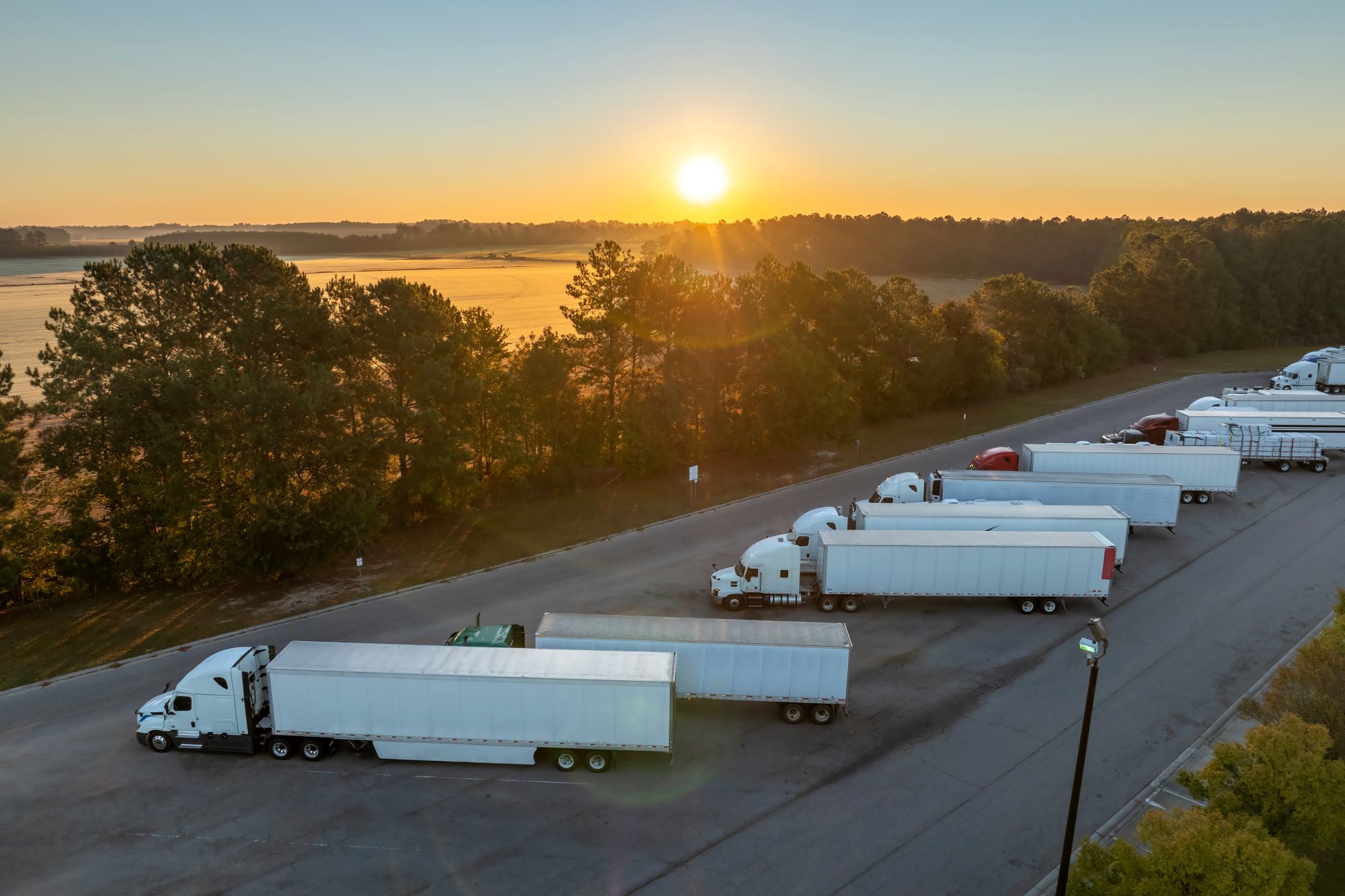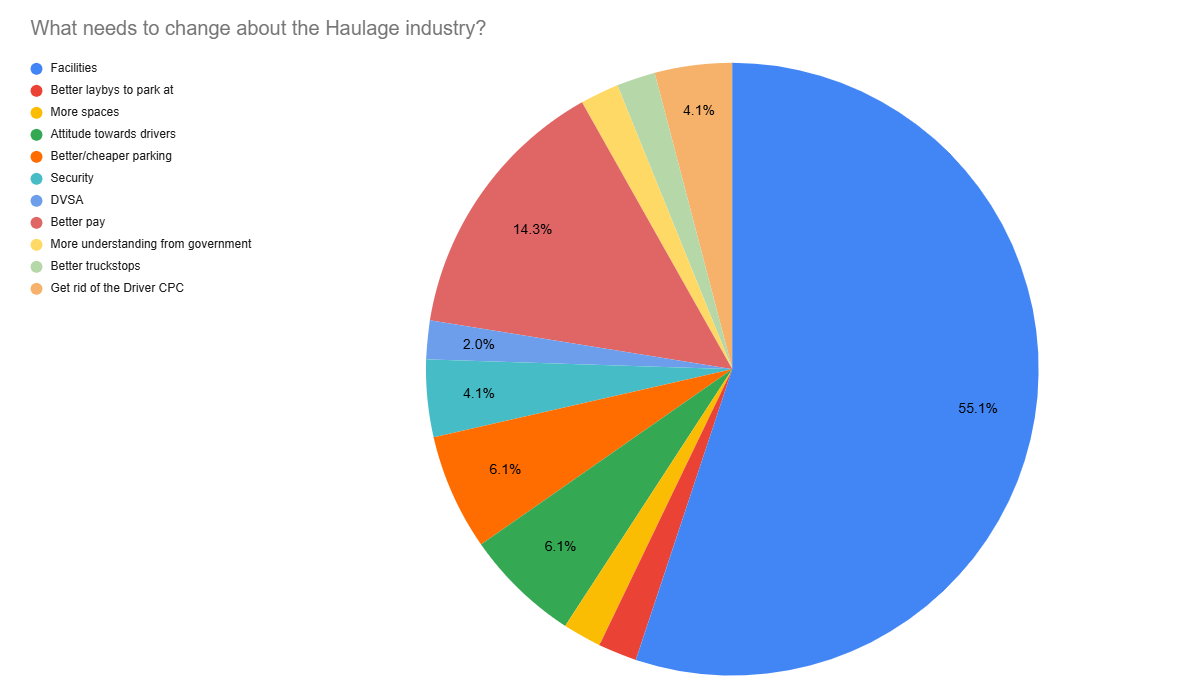
Susie Jones
Sunkvežimių vairuotojai ragina reformuoti pramonę
Sukurta: 05-02-2025
•
Atnaujinta: 05-02-2025
Šiuo metu JK sunkiasvorių sunkvežimių vairuotojai moterys sudaro tik 1 % visų vairuotojų - šis skaičius per pastarąjį dešimtmetį padidėjo 144 %, nes pradėta įgyvendinti daugiau iniciatyvų, kuriomis skatinama įvairovė ir mažinamas vairuotojų trūkumas.
Straipsnyje Fleetpoint aprašoma daugybė būdų, kaip pramonė galėtų pritraukti daugiau moterų:
puoselėti palankią ir draugišką darbo aplinką.
Infrastruktūros ir patogumų atnaujinimas.
Lankstus ir šeimai palankus darbo grafikas.
aiškių karjeros augimo būdų kūrimas.
Nepaisant to, vairuotojai socialinėje žiniasklaidoje teigė, kad prieš imantis naujų iniciatyvų, skirtų vairuotojų trūkumui mažinti, reikia išspręsti šias ilgalaikes pramonės problemas visiems.
Vairuotojų trūkumas - kur dabar yra pramonė?
Vairuotojų trūkumas buvo nuolatinė transporto pramonės problema, tačiau po COVID-19 ir "Brexit" ji pasiekė kritinį lygį. 2024 m. Europoje, Norvegijoje ir Jungtinėje Karalystėje trūko daugiau kaip 233 000 sunkvežimių vairuotojų - iki 2028 m. dėl senstančios darbo jėgos šis skaičius viršys 745 000.
Pramonė vis dar kovoja su pasekmėmis ir stengiasi įgyvendinti naujas iniciatyvas, skirtas įvairovei skatinti, darbo sąlygoms gerinti ir darbo jėgos atotrūkiui mažinti.
Vyriausybė įgyvendino maždaug [33](https://www.gov.uk/government/topical-events/hgv-driver-shortage-uk-government-response/about#:~:text=We%20extended%20dangerous%20goods%20(ADR,to%20take%20refresher%20training%20now.) veiksmus, kad išspręstų sunkiasvorių sunkvežimių vairuotojų trūkumo Jungtinėje Karalystėje problemą. Įskaitant, bet neapsiribojant:
esamų tiekimo grandinių efektyvumo didinimas.
Pagalba ir mokymas naujiems sunkiasvorių sunkvežimių vairuotojams.
Sunkvežimių vairuotojų egzaminavimo pajėgumų didinimas.
Licencijų išdavimo procesų tobulinimas.
Sąlygų gerinimas.
Degalų tiekimo grandinės stabilumo užtikrinimas.

Ką reikia keisti? Vairuotojai turi savo nuomonę.
49 proc. vairuotojų socialinėje žiniasklaidoje teigė, kad pokyčiai turi būti įgyvendinami nepriklausomai nuo lyties, o 27 proc. sunkiasvorių sunkvežimių vairuotojų moterų pritarė, kad šis sektorius turi būti plėtojamas visiems. 24 % teigė, kad darbas nebėra patrauklus, taip pabrėždami pokyčių poreikį šiame sektoriuje. Taigi, ką vairuotojai nori, kad būtų pakeista?
Priemonės
55 proc. norėjo, kad būtų pagerintos visiems prieinamos patalpos:
"Reikia geresnių sąlygų ir geresnio gydymo. Visa pramonė yra apgailėtina, o su mumis elgiamasi netinkamai."
"Patogumai yra siaubingi visiems vairuotojams, tiek vyrams, tiek moterims."
2024 m. lapkričio mėn. Transport Focus apklausos duomenimis, du trečdaliai vairuotojų buvo nepatenkinti sunkvežimių sustojimo aikštelėmis - daug problemų kėlė nešvarios patalpos, prastas maistas ir socialinės erdvės trūkumas.
Vyriausybė ir krovinių vežimo pramonė ėmėsi svarbių priemonių - investavo 14 mln. svarų sterlingų, kad paskatintų inovacijas ir pagerintų darbo sąlygas.
2024 m. spalio mėn. 23 atrinktiems pareiškėjams buvo skirta iki 4,5 mln. svarų sterlingų sunkvežimių stovėjimo aikštelėms įrengti. Atnaujinimo metu bus įrengti nauji dušai, restoranai ir patobulintos saugumo priemonės, kad vairuotojai būtų ramesni. Be to, pagal programą bus sukurta apie 430 stovėjimo vietų sunkiasvorėms krovininėms transporto priemonėms.
Mokėti
Antroje vietoje sąraše atsidūrė geresnis darbo užmokestis. 14 proc. vairuotojų teigė, kad didesnis darbo užmokestis paskatintų daugiau vairuotojų pradėti dirbti šiame sektoriuje:
"Padarykite ją patrauklią visiems, padidinkite darbo užmokestį."
Darbo užmokesčio didinimas pramonės lyderiams kainuos nemažai. Jei vidutinis sunkvežimio vairuotojo atlyginimas būtų padidintas pagal nacionalinį pragyvenimo minimumą, transporto priemonių parkų operatoriai per metus galėtų papildomai gauti 1,5 mlrd. svarų sterlingų.
Nepaisant to, investicijos pagerins darbuotojų išlaikymo rodiklius, sumažins įdarbinimo išlaidas ir mokymo išlaidas. Siūlant didesnius atlyginimus, ši profesija ne tik taptų patrauklesnė naujiems kandidatams, bet ir būtų pripažintas itin svarbus vairuotojų vaidmuo palaikant tiekimo grandinę.
Požiūris į vairuotojus
Bėgant metams visuomenės nuomonė apie sunkvežimių vairuotojus labai pasikeitė. Sunkvežimių vairuotojų gyvenimas dažnai romantizuojamas filmuose ir populiariojoje žiniasklaidoje, todėl daugelis mano, kad jiems lengva. Tačiau jie taip pat buvo vaizduojami kaip sunkiai dirbantys didvyriai, o laikui bėgant šis įvaizdis vis prastėjo.
XX a. pabaigoje požiūris pasikeitė, nes darbo sąlygos tapo sudėtingos, o sunkvežimių vairuotojai susidūrė su neteisingais stereotipais - dažnai dėl neteisingos informacijos žiniasklaidoje, o kartais ir dėl kelių nepatyrusių vairuotojų. Šie neigiami stereotipai sušvelnėjo per COVID-19 pandemiją, kai visuomenė ėmė labiau vertinti sunkvežimių vairuotojus.
Šiandien sunkvežimių vairuotojai yra gerbiami, tačiau šią pramonės šaką vis dar kamuoja neigiami stereotipai ir požiūris. 6 proc. vairuotojų norėtų, kad tai pasikeistų:
"Prisimenant Kovidą, buvome laikomi didvyriais, bet po to viskas grįžo į įprastas vėžes. Nenuostabu, kad dabartiniai vairuotojai, vyrai ir moterys, nori pasitraukti iš šios pramonės šakos. Jiems jau atsibodo, kad su jais kasdien elgiamasi šiukštu".
"Būtų malonu, kad su tavimi nebūtų elgiamasi kaip su šiukšle."
Pastaraisiais metais, atsiradus socialinei žiniasklaidai, neigiamas požiūris ėmė keistis ir keistis. Daugelis vairuotojų naudojasi tokiomis platformomis kaip "TikTok" ir "Instagram", kad pasidalytų įžvalgomis apie savo vaidmenį, išsklaidytų klaidingus įsitikinimus ir užsitarnautų pagarbą iš tų, kurie nėra šios srities atstovai.
Atsiliepimai rodo, kad krovinių vežimo pramonė turi skubiai įgyvendinti pokyčius, kad pritrauktų ir išlaikytų esamus ir naujus vairuotojus. Nepakankamas moterų skaičius išlieka didele problema, todėl labai svarbu investuoti į jų poreikius atitinkančias priemones. Tačiau šios investicijos turi būti integracinės ir naudingos visiems darbuotojams.

Kokiose šalyse trūksta sunkvežimių vairuotojų?
Labiausiai nukentėjo Europos šalys, nes daugelis sunkvežimių bendrovių negali plėsti savo verslo, nes neranda kvalifikuotų darbuotojų.
Europoje sunkvežimių vairuotojų populiacija sensta: vidutinis amžius - 47 metai. Trečdalis sunkvežimių vairuotojų yra vyresni nei 55 metų ir, kaip tikimasi, per ateinančius dešimt metų išeis į pensiją. Be to, mažiau nei 5 proc. sunkvežimių vairuotojų Europoje yra jaunesni nei 25 metų - tai rodo, kokia spraga liks, kai senstanti darbo jėga išeis į pensiją.
Ar yra sunkvežimių vairuotojų padėkos diena?
HGV vairuotojų diena vyksta sausio 22 d., ją įsteigė "NN1 Personnel". Šia diena siekiama pagerbti sunkvežimių vairuotojus ir visa tai, ką jie daro ekonomikos ir visuomenės labui.
Kokios yra sunkvežimių pramonės perspektyvos 2025 m.?
Iš mūsų tinklaraščio [The Road Ahead for 2025] (https://snapacc.com/newsroom/the-road-ahead-for-2025-truck-industry-trends-to-expect/) matyti, kad tikimasi, jog šiais metais sunkvežimių pramonėje bus svarbūs šie dalykai:
dirbtinio intelekto privalumų panaudojimas.
Lyčių atotrūkio ir vairuotojų trūkumo problemos sprendimas.
Ekologiškesnės pramonės skatinimas.
Didėjantis krovinių vežimas dideliais atstumais.


